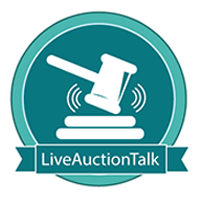Allen Ginsberg's Legacy
“I saw the best minds of my generation destroyed by madness.” Allen Ginsberg, “Howl”
LiveAuctionTalk.com: by Rosemary McKittrick
Photo courtesy of Bonhams.
Allen Ginsberg’s poetry lives on in the heart of American culture like butter on warm bread. He showed us the world through his unique voice, eyes, politics and spirituality. And his realness touched readers.
“I’m instinctively drawn to him,” said poet William Carlos Williams. “I have a strange feeling of exceptional sensitivity (in Ginsberg) that is almost lost.”
“I saw the best minds of my generation destroyed by madness.”
"Howl" is a poem Ginsberg wrote in 1955 and published in his 1956 collection of poetry titled “Howl and Other Poems.” It was actually written as a performance piece and is one of Ginsberg’s most recognizable poems. The epic work transformed him into the voice of his generation.
Reviews of “Howl” were all over the place.
“The single-minded frenzy of a raving madwoman” is how R.L. Rosenthal described it in his 1957 review of “Howl” in “The Nation.”
“If he keeps going, Ginsberg will be the first genuinely popular, genuine poet in over a generation,” said poet Kenneth Rexroth.
People who didn’t even read poetry read Ginsberg. And if they didn’t read his poetry they did know his name and who he was.
The poet was part of the Beat Generation of the 1950s and the Hippie movement of the 1960s. Ginsberg was really the chief figure among the Beats. He embraced the spirit of revolt which the era embraced.
He was a role model, a cultural presence, a personality steeped in openness. Ginsberg stood at the beginning of a period in history when people were disenchanted and questioning society’s traditional ways of doing just about everything.
His poems are a history of his time, a call for love in what he viewed as a painfully fractured world. People could see their own frustration in Ginsberg.
Academics couldn’t ignore the man because he wheedled his way into mainstream consciousness with open, spontaneous verse. They may have been put off by his Bohemian values, but he brought a new voice to American poetry that wouldn’t be denied.
“Modern rock lyrics would be inconceivable without the work of Allen Ginsberg,” said singer Lou Reed.
Ginsberg forced people, especially young people to take a look at the cultural values they swallowed whole and rethink them. He was open about his sexuality before it was popular. He opposed war, conformity, authoritarianism, materialism, and secret government operations. He spoke to people’s cynicism and to what he saw as America’s nervous breakdown.
On April 16, Bonhams, New York, held its Fine Books & Manuscripts auction featuring the Michael Lerner Collection. Included in the sale was one of only 25 copies of “Howl” made for presentation to Ginsberg’s friends. In addition to his inscription, the copy sold bears corrections in Ginsberg’s hand. The lot sold for $74,500.
Ginsberg introduced “Howl” at a reading on Oct. 7, 1955, at the Six Gallery in San Francisco. Poet Lawrence Ferlinghetti immediately expressed interest in publishing the poem under his City Lights imprint. At that time the poem was still in its infancy and Ginsberg continued to develop it over the following months.
Books
“In Our Time;” first trade edition, first printing; by Ernest Hemingway; 1925; $562.
“The Talented Mr. Ripley;” first edition; by Patricia Highsmith; black cloth, original dust jacket; 1955; $1,375.
“Ulysses;” first UK edition; no. 498 of 2,000 copies; custom box; by James Joyce; 1922; $1,875.
“In Our Time;” first limited edition, association copy, inscribed by Hemingway to Kate Buss (Massachusetts-born journalist); 1924; $47,500.





